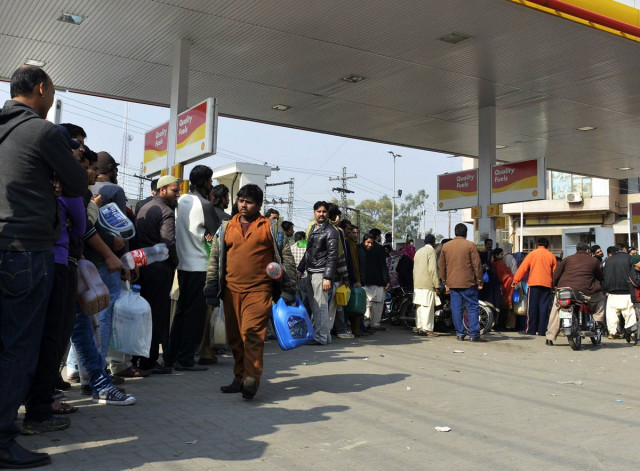Living in the Stone Age?
Government should fully accept blame of the petroleum shortage and penalise those responsible for the crisis

Motorists queue at a petrol station in Lahore on January 19, 2015. Delayed oil consignments have left large areas of the country facing major fuel shortages.PHOTO: AFP
Instead, what Pakistanis got was an acute shortage of petrol, which could only be explained after taking all the factors into account — the government’s inept policies and traditional short-sightedness taking the top place. In recent times, the prime minister has been happy in announcing reduction in prices of petroleum products, looking to take credit for the relief. But, when it comes to building reserves or enforcing rules to get oil marketing companies to increase their stocks, the government seemed to have done nothing substantial. And now faced with this crisis, the authorities have labelled it a “conspiracy”. But a conspiracy hatched by whom? Even the PTI sit-ins have ended — the government’s go-to excuse for any shortcoming. On the one hand, the finance minister is looking to lure foreign investors in the power sector; and, on the other, there is not enough fuel in major cities to run even small sedans. It is true that demand rose after consumers, already facing CNG shortage, said enough is enough and moved towards petrol as their new fuel. The effect of the price cut also led consumers to buy more. These concepts are taught on the first day of any economics class. However, with oil getting cheaper, the quantity being imported remained conservative so as to avoid inventory losses, with no planning seemingly done to account for the increased demand. Maybe, for a change, the government should fully accept blame of the petroleum shortage and penalise — from the public and private sectors — all stakeholders who caused and/or sat quietly as the public got a taste of living in the Stone Age.
Published in The Express Tribune, January 21st, 2015.
Like Opinion & Editorial on Facebook, follow @ETOpEd on Twitter to receive all updates on all our daily pieces.















COMMENTS
Comments are moderated and generally will be posted if they are on-topic and not abusive.
For more information, please see our Comments FAQ